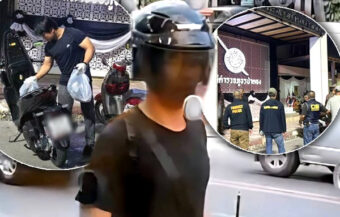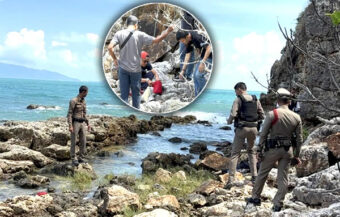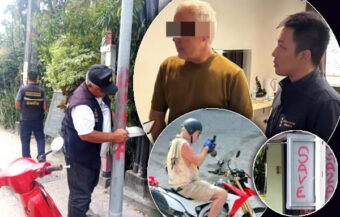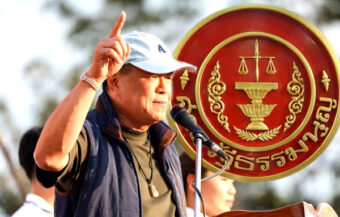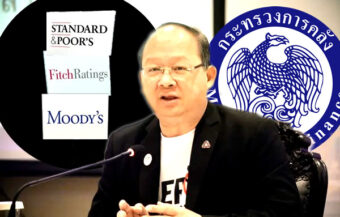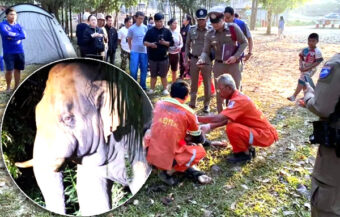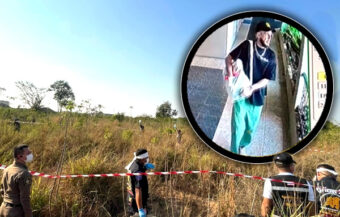Chinese man arrested in Tak after fleeing Myanmar scam hub, claiming he was lured by a fake job in Laos. His escape exposes ruthless cross-border fraud networks that trap foreigners, forcing them into scams, leaving police questioning victims or willing criminals.
A Chinese man, Mr. Zhao, was arrested in Tak province after swimming across the Moei River from Myanmar, claiming he was abducted while chasing a job in Laos. Instead, he was trapped in a scam operation along Thailand’s northwestern border. Police say his case exposes a sprawling network that lures foreigners with promises of fast money, then forces them into illegal schemes. Whether tricked, coerced, or drawn into crime, Zhao’s ordeal exposes the brutal reality of cross-border scams. It also leaves Thai police and soldiers with a dilemma: are such people victims, or willing criminals who changed their minds?
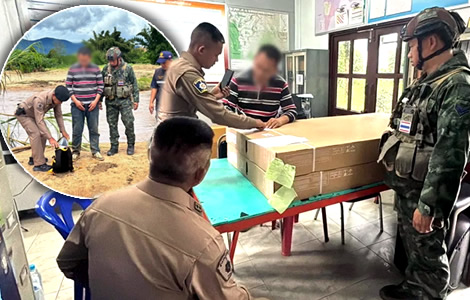
A Chinese man thought he was travelling to Laos for a legitimate job. Instead, he ended up trapped in a scam compound in Myanmar. The 43-year-old, identified as Zhou, escaped in desperation and reached Thailand after swimming across the Moei River.
Thai soldiers discovered Zhou on Sunday near a broken bridge at Ban Mo Koe Thai village in Phob Phra district. Exhausted and terrified, he had just crossed the river illegally. He was seeking help after realising the operation he had joined was criminal.
Zhou told authorities he had been lured by a seemingly legitimate job offer. On September 16, he arranged to meet a friend for work in Xishuangbanna, which he believed was in Laos. After travelling to the Thai border town of Phob Phra, he crossed into what he thought was Lao territory. A car was waiting to take him further.
A Chinese man thought he was travelling to Laos but was trapped in a Myanmar scam compound
However, he was actually entering Myanmar. “By the time he realised he’d been tricked into a scam operation, it was too late,” said a military source. Zhou said he quickly understood he was trapped in a criminal scheme that forced people to commit fraud.
He spent several days inside the compound before deciding to escape. Then, he retraced his steps to the river. At night, he swam across to reach Thai territory, hoping for safety. However, because he crossed illegally, Thai authorities detained him upon discovery.
Military officials handed Zhou over to local police on September 21. Police charged him with entering Thailand without permission, despite his valid Chinese passport. Zhou’s case highlights the dangers faced by foreigners lured into scams in border regions.
The region of Myanmar where Zhou was held is under the control of the Democratic Karen Buddhist Army (DKBA). Furthermore, the area has become a hub for online scams targeting victims worldwide. Criminal networks use fake job offers to trap people. Once inside, victims are forced to take part in fraud operations.
Zhou’s escape highlights how Myanmar scam hubs controlled by armed groups target foreigners globally
Authorities on both sides of the border are cracking down. Earlier this year, Thai officials cut electricity and internet to suspected scam compounds. Meanwhile, Chinese authorities repatriated over 2,800 nationals caught in similar schemes. Many were rescued from the border city of Myawaddy.
Experts warn these operations are highly organised. They employ locals and foreigners to manage communications, online transactions, and logistics. Victims are often promised high-paying jobs abroad. Once trapped, they face strict surveillance and coercion to participate in scams.
Zhou’s escape shows the peril and limited options victims face. He acted quickly at night, avoiding detection while reaching the river. Thai soldiers credited his survival to his determination and quick thinking. His ordeal is a stark warning for other job seekers.
Authorities crack down and repatriate thousands as Zhou’s escape reveals risks for foreign job seekers
The Moei River remains a dangerous crossing point. It is patrolled by the Thai military, but difficult terrain and few checkpoints make monitoring challenging. Consequently, people sometimes risk illegal crossings, unaware of the dangers or legal consequences. Authorities urge travellers to verify job offers carefully before crossing borders.
Chinese diplomats in Thailand confirmed they were aware of Zhou’s situation. They are providing consular support, including access to legal and translation services. Despite holding a valid passport, Zhou remains under legal scrutiny due to improper border crossing.
Authorities call for greater international cooperation to fight cross-border scams. Thailand, Myanmar, and China have increased intelligence sharing and repatriation efforts. They have also stepped up monitoring of border towns known for criminal activity.
Scams in border regions have grown in recent years. Criminal groups exploit complex international borders and uneven law enforcement.
The Moei River and border challenges show why authorities struggle to curb cross-border scam centres
Victims inside compounds often have few legal protections. Governments are working to educate the public on common tactics. Citizens are warned against unverified job offers abroad.
Zhou remains in Thai custody while officials review his case. His experience is a warning to others seeking work overseas. Thai security officials emphasise caution and the verification of all job offers. Cases like Zhou’s show the ongoing challenges of protecting vulnerable people from cross-border scams.
If he is to be believed, his story also highlights the evolving sophistication of these networks. Criminals combine coercion, deception, and logistical planning to ensnare foreigners. Meanwhile, authorities face difficulties due to limited access and complex border jurisdiction.
Victims have few protections as sophisticated networks trap foreigners across borders despite official efforts
For victims, escape is often risky and requires courage. Zhou’s actions demonstrate the thin line between survival and exploitation. Local police continue to urge vigilance, careful planning, and prompt reporting of suspicious activities.
The incident highlights the human cost of cross-border fraud. It reveals the need for stronger regional coordination, stricter enforcement, and public awareness. Above all, it highlights the risks facing individuals lured by false promises across international borders.
Tourism chief rebuts distorted scam centre reports linked to Taiwanese tourists. Now, a new, safer order
Arrest of scam centre kingpin and warlord ruler of Myawaddy Colonel Saw Chit Tu demanded by MP
Of course, the main problem is the relative lawlessness of parts of Myanmar now run by local warlords because of the lack of a central government and, of course, endemic corruption. A similar situation exists in Cambodia, where the Hun Sen dictatorship offers tacit support to the highly profitable scammer industry.
Join the Thai News forum, follow Thai Examiner on Facebook here
Receive all our stories as they come out on Telegram here
Follow Thai Examiner here
Further reading:
Thaksin does not rule out joining talks in US as Thai team finalises plans. They fly out on Thursday
Trump’s remaking of World trade, if it works, will force Thailand to decide between the US and China
US offers a 90-day tariff pause but Thailand must move faster as it already faces shaved GDP in 2025


